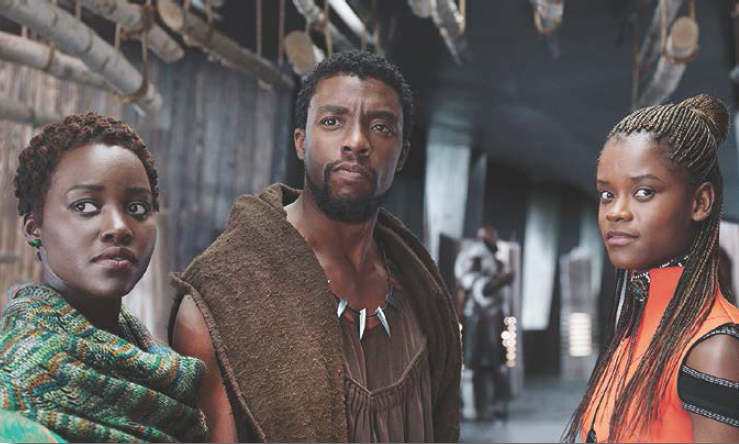Black Panther Roars into Theaters
Lupita Nyong’o, Chadwick Boseman and Letitia Wright
The Disney-Marvel film “Black Panther” hit theaters on Feb. 16 and immediately shattered box office records. Earning an estimated $404 million worldwide during its opening weekend, it became the most profitable February movie debut of all time, as well as the fifth-highest debut weekend gross ever.
This was also a historic release for Marvel as it is their first black-directed film with a primarily black cast. Director Ryan Coogler stylishly sets the scene of Wakanda, the fictional African kingdom untouched by European colonialism where “Black Panther” is set. Wakanda is home to Vibranium, a powerful, widely undiscovered mineral that cannot be found anywhere else in the world. The kingdom is guarded by the Black Panther, a half religious figure, half superhero passed through generations. The film tells the story of T’Challa (Chadwick Boseman), who takes over as the Black Panther after his father’s death. His abilities are put to the test when a powerful enemy suddenly reappears and puts the fate of Wakanda at risk. In the face of danger, T’Challa must release the full power of Black Panther to protect his people.
The film uses the mix of action and humor that audiences have come to expect in Marvel films, but “Black Panther” stands out for many reasons. The film touches on a variety of topics, including colonialism, isolationism and social justice, making this Marvel’s most politically charged release yet.
Since “Black Panther” covers so many serious topics that are relatable to real life, some might expect the film to be entirely solemn, but luckily this is not the case. The film balances seriousness with laugh-out-loud humor, making for an all-around entertaining experience. Another aspect of the film that stood out to me was its costumes, which were designed by Ruth E. Carter, and were based on actual dress wear from African tribes. The kingdom of Wakanda was shown in vibrant color, thanks to the work of Rachel Morrison, the first-ever woman to be nominated for an Academy Award for cinematography.
“Black Panther” also features a groundbreaking cast of women, who played characters who are being praised for their portrayal of strong, complex women who are not competing with one another; the types of characters I would like to see more of in the Marvel Cinematic Universe. Lupita Nyong’o, who plays Nikia, said of the roles of women in the film, “What I love about the way this film represents women is that each and every one of us is an individual, [and] unique.” This, along with the aspect of a primarily African American cast, also stresses the importance of representation in Hollywood.
“We all have our own sense of power and our own agency and we hold our own space without being pitted against each other,” said Nyong’o.
Audiences interested in the typical action-packed superhero movie will enjoy Black Panther, but the film’s deeper messages about race, social justice, and more will speak to viewers everywhere, and has the potential to spark important and necessary conversations in the film industry.
Your donation will support the student journalists of Saint Louis University.




